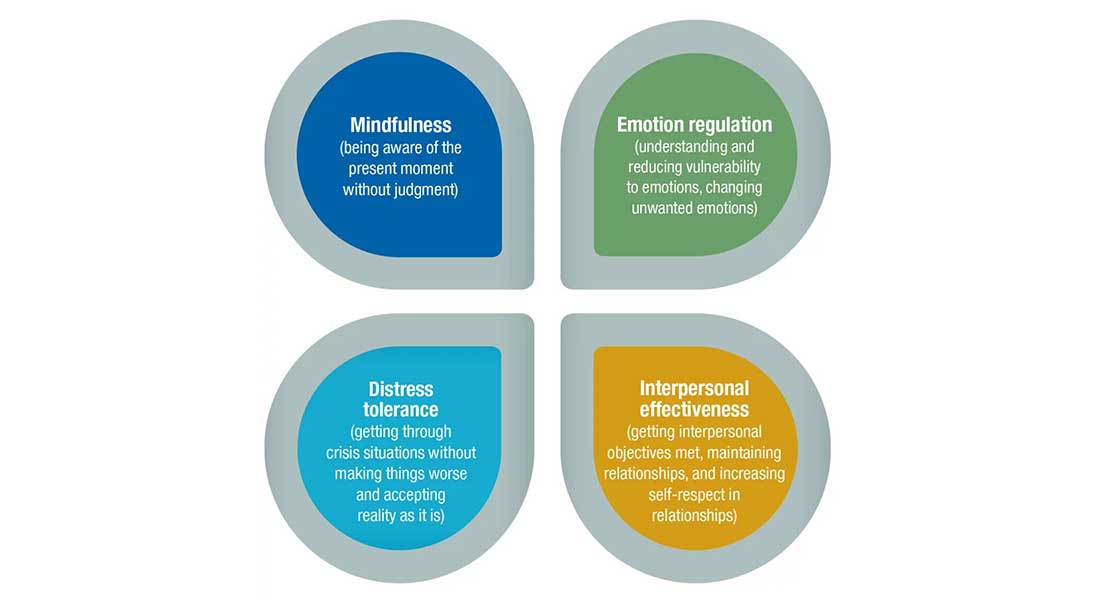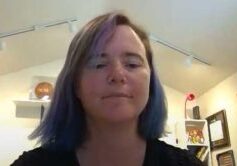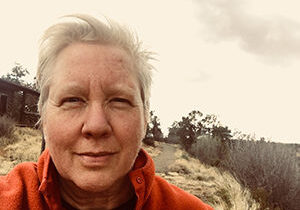DBT Residential Treatment and Day Treatment for Adults with Borderline Personality Disorder
Our most intensive level of care for adult clients with borderline personality disorder (BPD) is our intensive dialectical behavior therapy (DBT) program. Skyland Trail offers a DBT residential treatment program and a DBT day treatment program.
What is Dialectical Behavior Therapy (DBT)?
Dialectical behavior therapy (DBT) is one of the most researched treatments for borderline personality disorder and diagnoses involving emotional disregulation. It has been shown to be significantly effective in reducing suicidal ideation and self-harming behaviors common to those diagnosed with BPD, as well as improving a client’s ability to resist acting impulsively in stressful situations.
DBT is based on cognitive behavioral therapy (CBT), which has been used effectively for many years to treat individuals with mood and anxiety disorders. CBT is not effective for everyone - particularly for people who engage in self-injury, attempt suicide frequently, or struggle with intense emotions. Dr. Marsha Linehan adapted traditional CBT by adding therapeutic work focused on validation, acceptance and dialectics to meet the unique needs of these patients.
The overall goal of DBT is to help clients create a “life worth living.” Clients are encouraged to define what a "life worth living" looks like for them, and it varies from client to client. Clients then work toward addressing problem behaviors that are barriers to accessing that life.
Grace's Story

Foundational DBT Skills
The 90-day intensive DBT treatment program for adults at Skyland Trail addresses stage 1 of DBT therapy, which focuses on attaining foundational skills and capacity to manage suicidal behaviors, therapy-interfering behaviors, major quality-of-life-interfering behaviors, and deficits in behavioral skills. Dr. Marsha Linehan, creator of DBT, describes the goal of stage 1 as, "moving from being out of control of one's behavior to being in control."
The goal of DBT treatment at Skyland Trail is to help clients develop practical strategies to cope with intense emotions so that they can prevent repeat hospitalizations, practice healthy coping skills, and build trusting relationships with therapists.
Once they have learned the shared language and framework of DBT, and can use DBT skills to effectively participate in therapy and supportive social relationships, clients are prepared to continue therapeutic work on an outpatient basis in the community while living independently.
Evidence-based, Model-adherent DBT Program at Skyland Trail
Our intensively trained DBT treatment team meets weekly to discuss complex client cases and to develop comprehensive strategies to help clients progress. Across the organization, our multidisciplinary treatment team, including residential staff members, receive ongoing training on how to support DBT clients.
We adhere to the DBT model created by Dr. Marsha Linehan and Behavioral Tech, with some adaptions for residential program delivery. As part of the DBT model, clients have access to DBT phone coaching 24/7.
For adults with borderline personality disorder as well as an alcohol use, substance abuse, or addiction problem, Skyland Trail offers a dual diagnosis treatment program. Clients receive specialized psychiatric care focused on their personality disorder, but also participate in one-on-one and group therapy focused on preventing relapse maintaining sobriety.
Clients have access to 12-step programs on campus and in the community. And they receive unique education and support on how to manage both the symptoms of their thought disorder as well as the cravings and triggers of a substance use disorder.
Although many clients in our DBT program are learning to cope with trauma, the focus of stage 1 of DBT therapy does not involve working directly on post-traumatic stress. Skyland Trail practices trauma-informed mental health care. Trauma-informed care allows trauma survivors to first address the symptoms of a diagnosed mental illness like BPD before processing their trauma.
Throughout treatment, care providers acknowledge that the client has experienced trauma and validate the emotions arising from that experience. But the treatment team does not ask the client to describe or re-live the trauma in any way. Treatment strategies are focused on helping the client develop skills to handle difficult emotions and stressful situations in healthy ways.
Completing trauma-informed psychiatric treatment for BPD allows clients to develop insight, adopt skills, and build a strong foundation for healthy living. Clients who are trauma survivors are then better prepared and equipped to pursue formal trauma treatment with a specialized mental health provider.
Some clients with a history of trauma may be assigned to additional groups focused on addressing "stuck points" related to their trauma that are preventing them from making progress in therapy. These groups use an evidence-based approach called Cognitive Processing Therapy (CPT), which is a type of CBT.
Some people who have borderline personality also experience psychosis. Clients experiencing psychosis likely will enter the cognition and first episode (CAFE) recovery community. Once the psychosis is resolved through medications and therapy, clients may transition to the DBT recovery community if clinically appropriate.
Client Stories
The Four Modules of DBT
Clients participating in adult DBT therapy at Skyland Trail receive weekly one-on-one counseling sessions with their primary counselor, participate in skills groups, and have access to 24 phone coaching as needed. Clients also complete homework assignments and are asked to apply DBT skills learned in group to real-life experiences.
DBT skills are taught in four modules:
- Emotion Regulation
- Distress Tolerance
- Mindfulness
- Interpersonal Effectiveness

Age Appropriate BPD Treatment
Most young adults with borderline personality disorder will begin in our residential treatment program. They will live at the Rollins Campus or South Campus where they will have a private bedroom and bathroom and receive 24/7 nursing care.
We offer more than 150 different groups each week. Some groups are more general and are appropriate for clients of all ages and diagnoses. Other groups are more specialized. Examples of groups that address the unique challenges of young adults are those focused on healthy relationships in young adulthood, identity and insight, and social and assertiveness skills.
A men's peer support group, women's peer support group, and LGBTQ peer support group, and BIPOC peer support group also are offered as part of the holistic curriculum.
Family therapy with our family therapist may be recommended as part of the client's treatment. Family therapy helps families redefine individual roles within the family system, learn to support one another in healthy ways, and improve communication.
With the clients permission, families receive regular updates from the client's treatment team.
Older adults with borderline personality disorder who admit to our residential DBT treatment program live at Rollins Campus or Skyland Trail South Campus. In addition to 24/7 nursing support, they receive a private bedroom and bathroom.
We offer more than 150 different groups each week. Some groups are more general and are appropriate for clients of all ages and diagnoses. Other groups are more specialized. Examples of groups that address the unique challenges of this age group are those focused on loss and grief, finding work-life balance, anger and acceptance, codependence, and healthy relationships in middle to late adulthood.
A men's peer support group, women's peer support group, and LGBTQ peer support group, and BIPOC peer support group also are offered as part of the holistic curriculum.
A Holistic Approach to Wellness
Our clients can practice the skills introduced through counseling sessions as they participate in a structured schedule of social activities and art, music and horticultural therapy classes. Clients are encouraged to pursue purposeful activity, whether they are working toward going to school, getting a job, or finding a volunteer opportunity.
What's the Difference between DBT and CBT?
CBT helps clients understand the relationship between their thoughts, feelings and behaviors. While traditional CBT asks clients to change unhealthy thinking patterns and maladaptive behaviors, DBT also validates a client's lived experience and acknowledges the truth in the client's point of view.
DBT treatment also teaches clients to recognize what they have the power to change and what they must learn to accept. If they must accept the experience of pain, clients learn skills to cope with it. As they practice those skills, clients learn that they can cope with the pain and still live a meaningful life.
The "dialectical" part of dialectical behavior therapy helps clients challenge rigid thinking patterns and discover that the "truth" is often more gray than black-and-white. A friend can be late for an appointment AND still respect you. You can make a mistake AND still be a good person.
Learn More About DBT
4 Differences Between CBT and DBT
Learn the differences between CBT and DBT and how to know which one may be right for you
Understanding cutting and self harm
Individuals who engage in self-injurious behaviors often are using this unhealthy coping strategy to deal with emotional pain or confusion that they do not know how to process in any other way.
What is radical acceptance?
Radical acceptance is when you stop fighting reality, stop responding with impulsive or destructive behaviors when things aren’t going the way you want them to, and let go of bitterness that may be keeping you trapped in a cycle of suffering.
Survive a Crisis with DBT Distress Tolerance Skills
Through DBT, highly sensitive people learn distress tolerance skills that allow them to navigate uncomfortable or painful situations and manage urges to engage in harmful behaviors.
Using DBT to Confront Black and White Thinking
The goal with Dialectical Behavior Therapy is to find the truth in all sides so that we can be more willing and able to accept each moment for what it is… and what it is not.




















